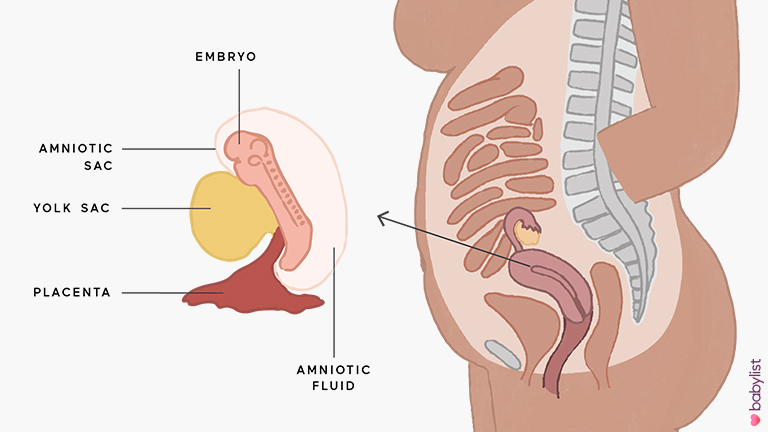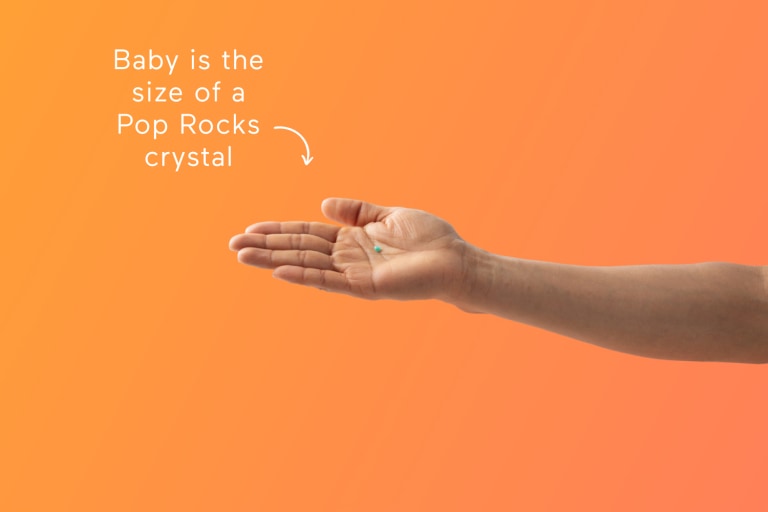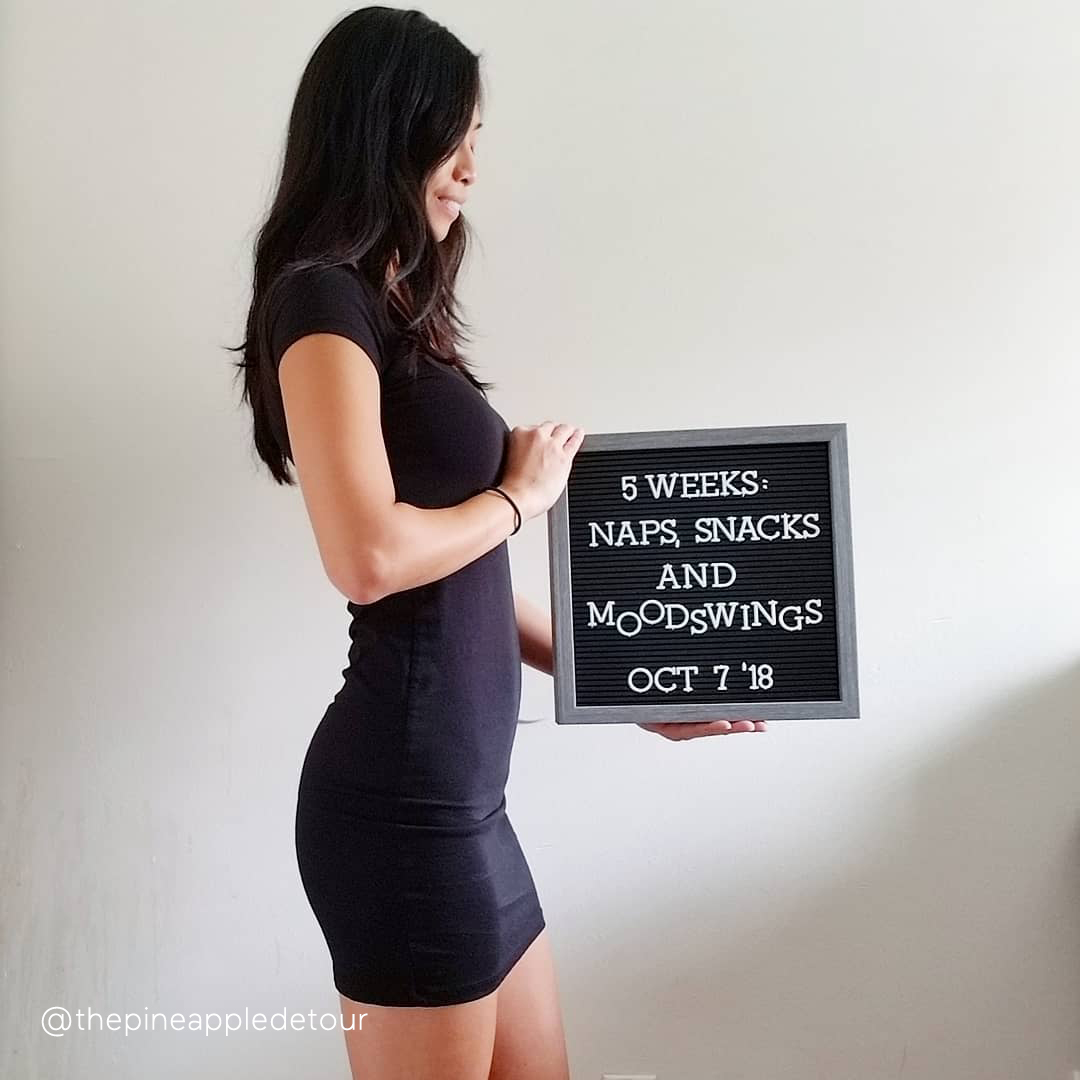5 Weeks Pregnant
At 5 weeks pregnant, you may be feeling nauseated, sore breasts and fatigue.
By Babylist Staff | Medically Reviewed by Dr. Alyssa Dweck
At 5 weeks pregnant, implantation has occurred, and you’re only a week or so past your missed period. You’re at the beginning of the journey, and you’ll be experiencing symptoms like tender breasts, cramps and fatigue soon. Here’s what else you can expect at week 5 of pregnancy.
What to Expect at 5 Weeks Pregnant
- How Many Months is 5 Weeks Pregnant?
- Your Baby at 5 Weeks
- Your Body at 5 Weeks Pregnant
- Frequently Asked Questions About Life At 5 Weeks Pregnant
- 5 Weeks Pregnant Checklist
How Many Months is 5 Weeks Pregnant?
5 weeks pregnant in months is one month pregnant, which is part of the first trimester of pregnancy.
Your Baby at 5 Weeks
If you were to have a 5 week ultrasound, your baby wouldn’t look very recognizable to the human eye. By week 5 of pregnancy, the embryo is about the size of rice seed, and looks more like a tiny tadpole than a human, says Dr. Kim Langdon, an ob-gyn with Medzino. But development is starting to ramp up. Here’s what else is going on with baby at week 5 of pregnancy.
- Organ development: It might seem early, but your baby is starting to develop major organs like the heart, stomach, liver and kidneys (though these are not yet discernible in an ultrasound). The brain and the spine also begin to form.
- Simple beginnings: Right now, your baby consists of three germ layers, which is a weird but technical term for the group of cells that make up the tiny embryo. The ectoderm will become your baby’s brain, spinal cord, skin and nails. The mesoderm will be the heart and circulatory system, and the endoderm will be the lungs, intestines and other major organs. “One of the first noticeable organs to work is the heart,” says Dr. Langdon. Human development is amazing!
How Big is Your Baby at 5 Weeks?
Your baby is 0.09 inches long this week. That’s about the size of a Pop Rocks crystal.
5 Weeks Baby Movement
You probably won’t feel the baby kick until a few weeks into the second trimester. Stay tuned!
How to Count Your Pregnancy Weeks
You might have been surprised when you found out you were pregnant, that you were already four or five weeks along. That flew by!
How did you skip the first month? Well, it’s hard to know exactly when a baby is conceived, but due dates are essential for understanding and studying pregnancy. Health professionals need a standard, so pregnancy is dated back to the first day of your last period, a.k.a. LMP (last menstrual period), even though your baby isn’t conceived until about two weeks after your LMP.
To find your due date, the basic formula is LMP + 280 days. Of course, it’s a little more complicated than that. In 2014, the American College of Obstetrics and Gynecologists updated their guidelines to include an early ultrasound measurement too. In other words, the due date could change depending on what your healthcare provider sees on the screen.
Get the full story here about how to count your pregnancy weeks, and if you don’t want to do the math yourself, no worries: we have a due date calculator right here.
Top Tip for 5 Weeks Pregnant
Go with your gut—share your pregnancy news when you feel it’s right. More and more people are opting to tell a few close friends as soon as they find out they’re pregnant rather than obeying a “12-week rule.” If you’re excited, there’s a good chance your friends and family will be too.
5 Weeks Pregnant Ultrasound

At 5 weeks pregnant, it’s still too early for an ultrasound, but if you did have one this is what you’d see.
Your Body at 5 Weeks of Pregnancy
How’d you first know you were pregnant? Some people realize they’re dead tired at 7 pm. Others weep openly while watching a TV commercial. The most common first signs of pregnancy people reported were missing their period, nausea and a change in their breasts (either soreness or darker areolas).
“Morning sickness and fatigue, breast tenderness are among the most common symptoms of early pregnancy,” says Dr. Langdon. So, if you’re experiencing any of those, you’re definitely not alone.
5 Weeks Pregnant Symptoms
During week 5 of pregnancy, things are starting to ramp up and you’re probably starting to feel like something is up. Here are a few symptoms you might be feeling at 5 weeks pregnant.
Rising hCG levels
At-home pregnancy tests are reliable after the first day of your missed period. They measure the level of the pregnancy hormone human chorionic gonadotropin (hCG), which is doubling every 48-72 hours.
Sore boobs
Those hormones are kicking into high gear to get your uterus started on making a baby, and this can cause really tender breasts.
Mood swings
The ups and downs tend to be most intense during the first trimester and postpartum, as hormone levels undergo big changes. Be gentle on yourself—eating right and getting enough rest can help—and remember that this pregnancy symptom will pass.
No symptoms
If you’re 5 weeks pregnant with no symptoms and didn’t have any implantation symptoms, there’s a chance nausea and fatigue will hit over the next few weeks. But there are also some parents-to-be who never get morning sickness at all. It all depends on your body; some people have no real symptoms beyond a growing belly the entire pregnancy.
Pregnancy Symptoms Coming Up In Week 6:
In week 6 of pregnancy, you may be experiencing spotting, food cravings or still have no symptoms.
Fun Fact
Before pregnancy, your uterus is about the size of an orange. By the end? We’re talking watermelon!
Real Baby Bumps at 5 Weeks Pregnant
Commonly Asked Questions
Now that you’re pregnant, you may be thinking about all of the lifestyle shifts you’ll need to make for the next nine months or so. Here are some questions people who are five weeks pregnant ask:
Can I drink coffee while pregnant?
The good news is you don’t need to cut out caffeinated beverages completely. “Most data suggest that low to moderate caffeine intake in pregnancy is not associated with any adverse outcomes to the baby or pregnancy,” Dr. Nathan Fox, ob-gyn and creator of the Healthful Woman podcast, tells Babylist. So how much is “low to moderate”? It’s typically defined as 200-300 mg of caffeine per day, so it’s a good idea to measure your intake by keeping track of how much caffeine is in different sources.
What foods should I avoid now that I’m pregnant?
The TLDR: Avoid raw and undercooked foods, like fish, shellfish, meat and eggs. Minimize fish high in mercury, such as tuna and shark. Don’t eat unpasteurized cheeses, milk or juices, or cold deli meats or lox. Some caffeine is okay, but you should probably avoid drinking alcohol while pregnant as it is known to be harmful to baby’s development, and there’s no amount that’s known to be safe. If you drank, smoked or did other things before you knew you were pregnant, chances are it’s okay.
Is cramping normal?
Light cramps are not uncommon, either as a sign of implantation or stretching of the uterus. More severe cramps, like you’d get during your period or worse, aren’t, so let your doc know if you’re feeling any abdominal pain.
5 Weeks Pregnant Checklist
- Start practicing your kegels. These little movements have big benefits as your pregnant body grows.
- Find out how your health insurance covers pregnancy and birth.
- Lay low and rewatch your favorite movie. You probably could use some rest right now. And don’t feel guilty about it—your body is hard at work.
Sources
- Dr. Kim Langdon, MD, OBGYN
- Dr. Nathan Fox,OBGYN and creator of the Healthful Woman podcast.
Babylist Staff
Editor
Babylist editors and writers are parents themselves and have years of experience writing and researching, coming from media outlets like Motherly, the SF Chronicle, the New York Times and the Daily Beast, and the fields of early childhood education and publishing. We research and test hundreds of products, survey real Babylist parents and consult reviews in order to recommend the best products and gear for your growing family.








